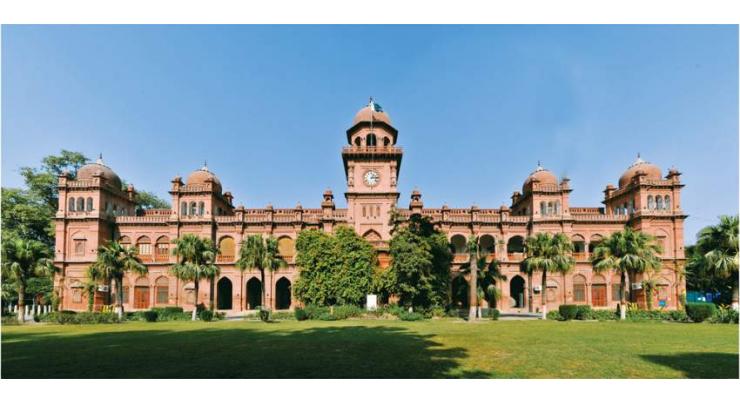
PU ISCS Organises Seminar On Beggary
Faizan Hashmi Published August 09, 2025 | 12:04 AM

The Punjab University (PU) Institute of Social and Cultural Studies (ISCS) on Friday organised a thought-provoking seminar titled “Socio-Legal and Ethical Implications of Beggary in Pakistan”, bringing together eminent scholars, legal experts, government officials, and media professionals to deliberate on the growing issue of beggary and its multifaceted impact on society.
LAHORE, (UrduPoint / Pakistan Point News - 8th Aug, 2025) The Punjab University (PU) Institute of Social and Cultural Studies (ISCS) on Friday organised a thought-provoking seminar titled “Socio-Legal and Ethical Implications of Beggary in Pakistan”, bringing together eminent scholars, legal experts, government officials, and media professionals to deliberate on the growing issue of beggary and its multifaceted impact on society.
Vice Chancellor University of Chitral Prof Dr Hazir Ullah, while addressing the seminar, termed beggary a complex and deeply rooted socio-economic challenge that requires coordinated and multi-sectoral efforts. He underscored the intergenerational nature of beggary, stating that many beggars involve their children in the practice, thereby sustaining a cycle of poverty.
Dr Hazir Ullah emphasised the need for nationwide awareness campaigns, responsible charity practices and educational reforms to address the issue.
Director ISCS Dr Farhan Navid Yousaf, highlighted how cultural and societal norms have contributed to the proliferation of beggary in Pakistan. He noted that the practice adversely affects the country's image and called for collaborative efforts from the government, civil society and the public to tackle the issue effectively.
Sociologist Dr Nadeem Abbas presented alarming data from a WHO 2018 report, noting that over 1.2 million people die in road accidents globally each year, with beggars at traffic signals contributing to road safety hazards in Pakistan.
Representing the Social Welfare Department, Muzammal Yar provided insights into the 1958 Anti-Beggary Act and detailed ongoing efforts since 2015, including the establishment of beggar homes that offer vocational training, rehabilitation, and healthcare services.
Senior journalist Ajmal Jami urged religious scholars and youth to take an active role in countering the exploitation of charitable traditions by organised beggary networks. He emphasised the need for a cultural shift in public attitudes toward charitable giving.
Barrister Haaris Ramzan identified legislative gaps in the Punjab Vagrancy Ordinance 1958 and stressed the need to enhance the capacity and performance of law enforcement agencies in implementing anti-beggary laws.
Director DSA Dr Shahzeb Khan highlighted community-based projects initiated by PU students during the summer break, aligned with the United Nations’ Sustainable Development Goals (SDGs), aimed at social reform and awareness.
Col (retd) Shahzad Amir, CEO of the Charity Commission, spoke about Pakistan’s philanthropic spirit and how it is often misused by professional beggars, calling for better regulation of charitable giving.
Towards the end of the session, souvenirs were presented to the distinguished speakers by Dr Farhan Navid Yousaf and DG SES Dr Rehan Sadiq Sheikh in recognition of their valuable contributions.
The event was attended by faculty members, legal professionals, students, and representatives from civil society, who engaged in meaningful dialogue aimed at curbing the menace of beggary through informed policy and grassroots action.
Recent Stories

Ministry of Defence undersecretary visits Sacheon Air Base in Korea

UAE leaders condole with President of Ghana over helicopter crash victims

PU ISCS organises seminar on beggary

Shaza, GSMA team talk about future cooperation, spectrum reforms

JI's vocational project 'Bano Qabil' to produce skilled workforce

Annual Urs of Hazrat Bari Imam underway amid tight security, food safety checks

GPI delegation calls on Special Assistant Salma Butt
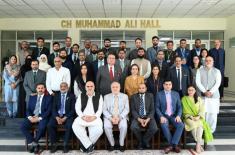
CSA concludes HEC officers training programme

Nasir Shah hints commencement of Thar Coal gasification soon
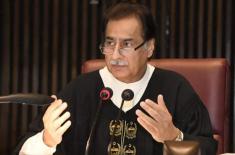
NA Speaker praises forces for foiling infiltration in Zhob
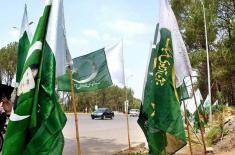
Grand musical concerts kick off in Hyderabad to celebrate independence, Marka-e- ..
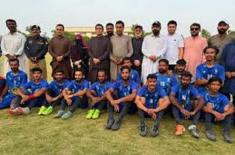
Commissioner announces awards for best decorations on Independence Day & "Maraka ..
More Stories From Pakistan
-
NA Speaker condemns Israeli cabinet’s approval of Gaza occupation
8 minutes ago -

PU ISCS organises seminar on beggary
4 minutes ago -

Shaza, GSMA team talk about future cooperation, spectrum reforms
4 minutes ago -

JI's vocational project 'Bano Qabil' to produce skilled workforce
4 minutes ago -

Annual Urs of Hazrat Bari Imam underway amid tight security, food safety checks
4 minutes ago -

GPI delegation calls on Special Assistant Salma Butt
4 minutes ago
-

CSA concludes HEC officers training programme
27 minutes ago -

Nasir Shah hints commencement of Thar Coal gasification soon
36 minutes ago -

NA Speaker praises forces for foiling infiltration in Zhob
27 minutes ago -

Grand musical concerts kick off in Hyderabad to celebrate independence, Marka-e-Haq
27 minutes ago -

Commissioner announces awards for best decorations on Independence Day & "Maraka-e-Haq" Celebrations
27 minutes ago -

Man kills wife six months after love marriage in D.I. Khan
27 minutes ago










